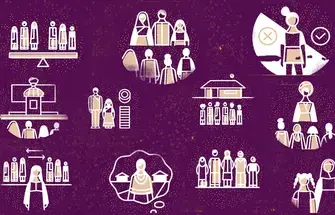It’s a fact that men die younger than women. It’s a fact that men are over-represented in almost every major disease category. And, it’s a fact that masculine norms and the gendered nature of paid work contribute to this. But, men’s health isn’t just a problem for men - men’s health matters to everyone.
Men need to take better care of themselves - both for themselves and for others. Women generally bear the brunt of care for men who are sick or living with disabilities. Children suffer adverse outcomes due to the ill health of caregivers. Society bears the social and economic cost of premature death and of looking after the sick.
Harmful gender norms and stereotypical male roles play a part in this. On the surface men seem to have it all their own way: on average, men earn 20 per cent more than women, men fill 70 per cent of congresses and parliaments, and men head most businesses.
“We have privilege as men,” says Dr. Gary Barker, co-founder of the non-governmental organization Promundo. “And the Paradox is that we also suffer by trying to live up to these ideas of manhood. We are three quarters of suicides in the world. We die five years earlier than women.”
In some countries in the Eastern Europe and Central Asia region, men die ten years earlier than women. According to the WHO, these premature deaths are largely due to smoking, drinking, an unhealthy diet and not going to the doctor for help when needed. Poor health affects mobility, productivity, and quality of life. On the other hand, men in good physical and mental shape are better able to participate in caregiving and household responsibilities, reducing the burdens on families and partners.
“The ideas of manhood that we try to live up to [as] men, give us privilege,” says Barker. “And we also pay the price in our health, mental health, and the lack of connection to others that we would like to be in connection with.”
Despite the evidence, the push to improve men’s health has struggled to gain traction on a global scale. Indeed, according to a report by Promundo, Brazil, Ireland, and Australia are the only countries to have created national men’s health policy frameworks or departments.
Here are seven ways men can protect their health:
Eat well and exercise
A good diet, with plenty of fruits and vegetables, provides a solid foundation for a healthier lifestyle. Fast and fatty foods will only exacerbate existing conditions and possibly encourage the onset of others. Combined with a regular exercise regime, diet is the first step towards a healthier lifestyle. And regular exercise does not require a gym membership. Take the stairs, and not the lift, walk or cycle to work, take part in a sport you love, and do it regularly. Exercise makes you feel better both physically and mentally.
Get tested for sexually transmitted infections (STIs)
Stigma surrounds testing for HIV and STIs, yet these infections are widespread. Gone untreated, HIV and many STIs are passed on to partners, can cause unnecessary suffering and premature death. HIV testing services must follow WHO-recommended principles known as the “5 Cs”: informed Consent, Confidentiality, Counselling, Correct test results, Connection (linkage to care, treatment, and other services). Respect the health of you and your partner, lose the stigma, and get tested.
If you're feeling down, talk to someone
While a balanced diet and regular exercise are a good start to a healthier lifestyle, sometimes life can get on top of us. Men suffer from depression just as much as women, however, they are less likely to seek help and get it diagnosed. If you feel low - for whatever reason - talk to someone. It could be your partner, a close friend, a doctor, or a counsellor. It doesn’t matter who you talk to, but it does matter that you do talk. Talking is the first step towards coping with difficult situations.
Use contraception
Contraception doesn’t just prevent unwanted pregnancies, it can protect you and your partner from STIs and the use of contraception shows that you respect your partner and are equally concerned about each other’s health. Make contraception a conversation. Talk to your partner about contraceptive choices. Many men know little about sexual and reproductive health issues, including family planning. Learning about the pros and cons of different contraceptive methods is an important first step towards breaking down misinformation and communicating better with your partner.
Towards healthier relationships
A healthy relationship helps your physical and mental well-being. Open discussions will help you and your partner make informed decisions. Whether it be dividing up domestic duties, sharing the financial burden, or family planning - good decisions are made through good discussions.
Get a check-up
86 per cent of male deaths are caused by non-communicable diseases and injuries. The main disease-related killers are cardiovascular diseases, cancers, diabetes, and respiratory diseases. Book an appointment with your doctor and get a check-up. It is possible to spot many of these killers before they become life-threatening, meaning preventative action can be taken. Check-ups save lives and keep families together longer.
Spread the word
Lastly, spread the word. Talk with other men and boys about living a healthier lifestyle, and about how health-seeking behaviors can change your life. And, encourage the men, and boys, in your life to do the same.
To learn more about men’s health and what you can do to protect your health, check out the resources provided by our partners at the Men Engage Alliance and Promundo.














